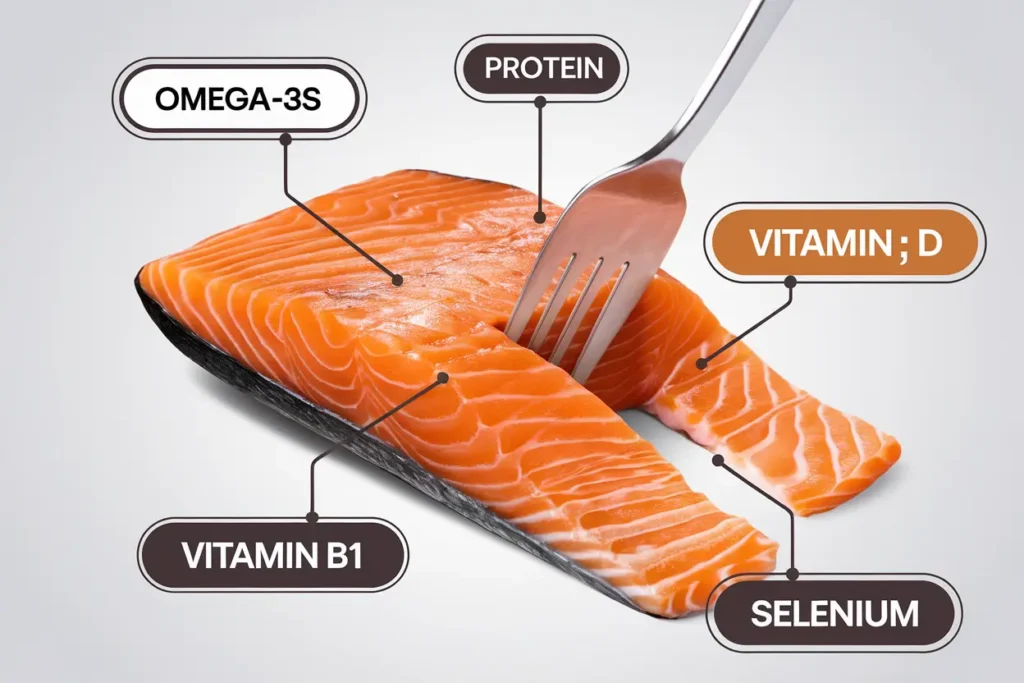Introduction to Breakfast Nutrition
Is it good to eat salmon for breakfast? Breakfast is often hailed as the most important meal of the day, setting the tone for your energy, mood, and focus. Including salmon, a nutrient-packed fish, in your morning meal could provide the boost your body needs. While common choices like cereal and toast are convenient, they may lack the robust nutrition salmon offers, such as omega-3 fatty acids and high-quality protein.
Let’s dive into the benefits, creative recipes, and possible downsides to decide if salmon deserves a place at your breakfast table.
The Importance of a Balanced Breakfast
Is it good to eat salmon for breakfast? A balanced breakfast is more than just a morning ritual; it’s essential for your overall health. Eating the right mix of macronutrients—proteins, fats, and carbohydrates—gives your body the fuel it needs to start the day. Salmon fits perfectly into this equation. Its high-quality protein and healthy fats make it an excellent addition to a nutritious morning meal. By including salmon, you can enjoy a breakfast that supports brain function and heart health while keeping you energized.
Why Salmon is a Popular Breakfast Option
Is it good to eat salmon for breakfast? For many people, the answer is yes. Salmon has become a standout choice because it’s both delicious and versatile. Its remarkable nutritional profile aligns with what a balanced breakfast should offer. This nutrient-packed fish provides protein, omega-3 fatty acids, and essential vitamins, which are all important for your health. Additionally, salmon pairs wonderfully with other breakfast staples, making it a favorite for those who want a mix of flavor and nutrition.
Nutritional Profile of Salmon

The nutritional content of salmon is a big reason for its growing popularity as a breakfast food. Whether smoked, grilled, or cured, salmon brings a host of benefits to your plate.
High-Quality Protein
Salmon is an excellent source of lean protein, which is essential for muscle repair and overall growth. Starting your day with a protein-rich meal helps to keep hunger pangs at bay and maintains energy levels throughout the morning.
Omega-3 Fatty Acids Benefits
Is it good to eat salmon for breakfast? One of the biggest reasons to say yes is its high content of omega-3 fatty acids. These healthy fats are amazing for your body in many ways. For example, they improve brain function, reduce inflammation, and support heart health. Adding salmon to your breakfast is an easy and effective way to ensure you’re getting these essential nutrients. As a result, starting your day with salmon can boost your overall health and energy, making it a smart choice for a balanced breakfast.
Vitamins and Minerals in Salmon
Salmon is also packed with essential vitamins and minerals, such as Vitamin D, Vitamin B12, and selenium. These micronutrients play crucial roles in maintaining bone health, supporting the immune system, and boosting energy levels.
The Role of Salmon in Traditional Breakfasts
Around the world, salmon has long been celebrated as a breakfast ingredient. Its inclusion in traditional breakfasts showcases its versatility and universal appeal.
Lox and Bagels
A classic breakfast dish, especially in American and Jewish cuisines, is the combination of smoked salmon (lox) with cream cheese on a toasted bagel. This dish offers a balanced blend of carbs, fats, and protein, making it both satisfying and nutritious.
Scandinavian Breakfast Plates
In Scandinavian countries, salmon often features prominently in breakfast spreads alongside rye bread, boiled eggs, and pickled vegetables. This traditional pairing highlights salmon’s ability to complement a wide range of flavors.
Health Benefits of Eating Salmon for Breakfast
Incorporating salmon into your breakfast routine can have numerous positive effects on your health. As a nutrient-dense food, salmon offers a variety of benefits that can improve both your physical and mental well-being.
Improved Brain Function
Is it good to eat salmon for breakfast? One compelling reason is its ability to boost brain health. Salmon is packed with omega-3 fatty acids, especially DHA (docosahexaenoic acid), which plays a critical role in supporting cognitive function. Studies show that regular intake of omega-3s can enhance memory, improve focus, and lower the risk of neurodegenerative diseases like Alzheimer’s. By including salmon in your morning meal, you’re setting yourself up for a sharper and more productive day.
Heart Health and Cholesterol Management
The heart-healthy benefits of salmon are well-documented. Its omega-3 fatty acids help lower triglycerides, reduce bad cholesterol (LDL), and increase good cholesterol (HDL). Additionally, these fats support arterial health, reducing the risk of heart disease. Eating salmon for breakfast can be an excellent step toward maintaining cardiovascular health.
Sustained Energy Levels
The combination of protein and healthy fats in salmon provides long-lasting energy. Unlike high-sugar breakfast foods that lead to spikes and crashes in blood sugar levels, salmon helps maintain stable glucose levels. This makes it a perfect choice for those with busy mornings or active lifestyles.
Potential Downsides to Eating Salmon for Breakfast
While salmon is packed with health benefits, it’s important to consider some potential drawbacks before making it a breakfast staple. Understanding these factors can help you make informed choices and enjoy salmon responsibly.
Mercury and Contaminant Concerns
Like many types of seafood, salmon can contain traces of mercury and other environmental contaminants, such as polychlorinated biphenyls (PCBs). While these levels are generally low in most salmon, frequent consumption might increase exposure. Opting for wild-caught salmon over farmed varieties can help reduce this risk, as wild salmon tends to have fewer contaminants.
Cost and Accessibility
Salmon is undeniably nutritious, but it can also be expensive compared to other breakfast proteins like eggs or yogurt. Additionally, not everyone has access to fresh, high-quality salmon, especially in landlocked regions. For those on a budget, options like canned salmon or occasional servings may be more feasible.
Overconsumption of Sodium
Smoked salmon, a popular breakfast choice, often contains high levels of sodium due to the curing process. Excess sodium intake can contribute to high blood pressure and other cardiovascular issues. If you’re watching your sodium intake, consider pairing smoked salmon with lower-sodium ingredients or opting for fresh salmon instead.
Creative Ways to Incorporate Salmon into Breakfast
Salmon is a wonderfully flexible ingredient that works beautifully in breakfast recipes. Whether you prefer it fresh, smoked, or cooked, it’s easy to include this nutritious fish in your morning routine. Below are some creative and simple salmon breakfast ideas to get you started.
Smoked Salmon and Avocado Toast
Avocado toast has become a popular choice for breakfast, and adding smoked salmon takes it to a whole new level. To prepare this dish, layer thin slices of smoked salmon on whole-grain toast spread with mashed avocado. For extra flavor, sprinkle on a pinch of black pepper and a drizzle of lemon juice. This dish not only tastes delicious but also provides a healthy dose of good fats. Plus, it offers a balance of creamy and savory flavors that will make your morning meal feel indulgent.
Salmon and Egg Breakfast Scramble
For those who need a filling, high-protein breakfast, a salmon and egg scramble is a perfect choice. Start by flaking some cooked salmon—leftovers work great—and mix it into scrambled eggs as they cook. You can add chopped green onions or a dash of hot sauce for extra flavor. This quick and easy recipe is ideal for busy mornings when you need something satisfying and nutritious to keep you going.
Salmon Breakfast Burritos
If you’re looking for a breakfast that’s both portable and hearty, try making a salmon breakfast burrito. Begin by filling a whole-wheat tortilla with scrambled eggs, flaked salmon, diced tomatoes, and shredded cheese. To make it even tastier, add a dollop of Greek yogurt or salsa. Then wrap it all up, and you have a wholesome breakfast that’s perfect for eating on the go.
Salmon in Smoothies: A Unique Twist
For the adventurous, consider blending cooked or smoked salmon into a savory breakfast smoothie. Combine it with spinach, avocado, lemon juice, and a bit of unsweetened yogurt. While unconventional, this smoothie is a nutrient powerhouse and a fun way to switch up your breakfast routine.
Tips for Selecting and Preparing Salmon for Breakfast
Choosing the right type of salmon and preparing it properly can make all the difference in creating a delicious and nutritious breakfast. Here are some practical tips to guide you in making the most out of this superfood.
Choosing Between Wild and Farmed Salmon
When shopping for salmon, you’ll often have to choose between wild-caught and farmed varieties. Wild salmon generally has fewer contaminants, a more robust flavor, and a better omega-3 to omega-6 ratio. Farmed salmon, on the other hand, is usually more affordable and widely available but may contain higher levels of pollutants and artificial additives. Opt for wild salmon whenever possible for optimal health benefits.
How to Store Salmon Safely
Proper storage is crucial to maintaining the freshness and safety of salmon. If you purchase fresh salmon, keep it in the coldest part of your refrigerator and consume it within two days. For longer storage, freeze the salmon in an airtight container or vacuum-sealed bag to prevent freezer burn. Smoked salmon should also be refrigerated and consumed by the use-by date on the package.
Cooking Methods That Retain Nutritional Value
How you cook salmon can impact its nutritional profile. Here are some methods that preserve its health benefits:
- Grilling: Enhances the flavor while keeping the omega-3s intact.
- Poaching: A gentle cooking method that avoids adding unnecessary fats.
- Baking: Simple and effective, especially when seasoned with herbs and spices.
- Pan-Searing: Locks in flavor with a crisp exterior when cooked with a small amount of olive oil.
Avoid overcooking, as it can dry out the salmon and reduce its nutritional value.
Frequently Asked Questions (FAQs)
Is smoked salmon healthy for breakfast?
Yes, smoked salmon can be a healthy breakfast option. It is rich in omega-3 fatty acids, high-quality protein, and essential vitamins like B12. However, smoked salmon is often high in sodium due to the curing process, so it’s best to consume it in moderation, especially if you’re watching your salt intake.
Can I eat salmon every day for breakfast?
While salmon is highly nutritious, eating it every day may not be ideal due to concerns about mercury and contaminants found in fish. It’s best to include salmon as part of a varied diet, incorporating other protein sources like eggs, beans, or yogurt to maintain balance.
What are good pairings with salmon for breakfast?
Salmon pairs well with a variety of breakfast foods, including:
- Whole-grain bread or bagels
- Eggs (scrambled, poached, or fried)
- Avocado
- Fresh vegetables like spinach, tomatoes, or cucumbers
- Cream cheese or Greek yogurt
These combinations enhance both flavor and nutritional value.
How many calories are in a typical salmon breakfast?
The calorie count depends on the preparation and accompaniments. For example:
- Smoked salmon on avocado toast: ~300-400 calories
- Salmon and egg scramble: ~250-350 calories
- Salmon breakfast burrito: ~400-500 calories
These options provide a balanced mix of macronutrients to fuel your morning.
Is canned salmon a good breakfast option?
Absolutely! Canned salmon is a convenient and affordable alternative to fresh or smoked salmon. It retains most of the nutrients found in fresh salmon, including omega-3s and protein. Use it in scrambles, breakfast bowls, or spread on toast for a quick and healthy meal.
What are the differences between raw and cooked salmon?
Raw salmon, such as sashimi or in smoked form, offers a softer texture and a more delicate flavor. Cooked salmon has a firmer texture and a richer taste. Both options are nutritious, but raw salmon must be handled and stored carefully to avoid contamination.
Conclusion: Is Salmon for Breakfast Right for You?
Salmon is undoubtedly a powerhouse ingredient, offering a wealth of nutrients like omega-3 fatty acids, high-quality protein, and essential vitamins that make it an excellent choice for breakfast. Whether you enjoy it smoked on a bagel, flaked into scrambled eggs, or incorporated into creative recipes like breakfast burritos, salmon can elevate your morning meal in both taste and nutrition.
That said, it’s essential to enjoy salmon in moderation, be mindful of sodium content in smoked varieties, and balance it with other wholesome breakfast options. By selecting high-quality salmon and preparing it thoughtfully, you can enjoy its numerous health benefits without the downsides.
Ultimately, incorporating salmon into your breakfast routine can be a delicious way to start your day with sustained energy and essential nutrients. So, is it good to eat salmon for breakfast? Absolutely—with the right approach, it can be a game-changer for your mornings.

